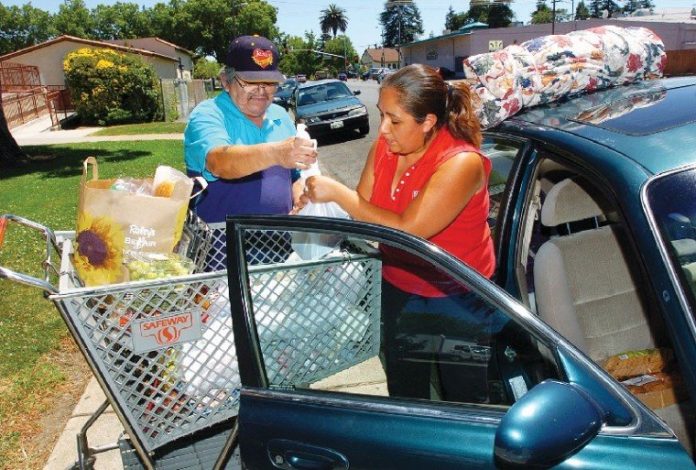Vanishing grants and slow summer donations have sapped St.
Joseph’s Family Center of funds, resulting in a $100,000 shortfall
for the agency that stocks the kitchens of Gilroy’s less
fortunate.
Gilroy – Vanishing grants and slow summer donations have sapped St. Joseph’s Family Center of funds, resulting in a $100,000 shortfall for the agency that stocks the kitchens of Gilroy’s less fortunate.
“We feel like we’re in the same crisis situation as many of our families,” said executive director David Cox. This is the first time in his six-year tenure with St. Joseph’s the agency has predicted a budget deficit, Cox said. “This year, it seemed to hit us from all sides.”
Several factors combined into a perfect storm: County reserve funds for St. Joseph’s rental assistance program ran dry. Federal red tape fouled up a grant transfer that would keep the Ochoa migrant camp open this winter as transitional housing. Donations lagged this summer. And a shift in the United Way’s approach to doling out dollars left St. Joseph’s sadly short.
For nonprofits, “it’s never all good news, and we hope it’s not all bad news,” said Lisa De Silva, director of development for Community Solutions, another area nonprofit. “Unfortunately for St. Joseph’s, it has been all bad news.”
To minimize the pain, St. Joseph’s is trying to spread the cuts evenly among its different programs. Cox said one staff member was laid off and the center’s county-funded emergency assistance program, which chips in for utility bills, will give half as much money this year – $40,000 instead of $80,000. Pricey extras such as milk, meat, diapers and baby formula, which St. Joseph’s food pantry buys to supplement grocery donations, will likely be scaled back, he said.
“We just have no choice,” said Cox.
Nor can the agency open the Ochoa Migrant Camp to homeless families this winter. In the past, St. Joseph’s operated the program in tandem with the county Housing Authority, splitting the cost that wasn’t covered by federal grants. When the camp grew too costly for the Housing Authority, St. Joseph’s tried to take over the grant, but the bureaucratic process to transfer the grant from the Housing Authority to St. Joseph’s proved too difficult to complete this year, Cox said.
Federal agencies also expanded the length of time that migrant workers spend in the camp, Cox added, narrowing the window when homeless families could move in for the winter, after migrants move out.
Other agencies are also suffering: Child care provider Go Kids Incorporated lost $18,000 in United Way funds targeted for child care scholarships for low and middle-income families, said Go Kids executive director Larry Drury. Community Solutions was forced to jettison the popular El Toro Youth Center, said De Silva, and lost $63,000 in United Way funding.
“The good news is, they’re still funding us,” said De Silva. “The bad news is, we took a much more significant financial hit than some agencies that weren’t funded at all.”
United Way expanded Gilroy funding 48 percent
Yet United Way funding has been significantly bolstered in Gilroy, up 48 percent from $114,000 to $222,000 this year, and the same number of programs are being funded – though they’re not necessarily the same programs, as St. Joseph’s and GoKids’ plight illustrates. The network’s Silicon Valley chapter recently revamped its funding system, setting $50,000 as its minimum grant amount. Now, the group prioritizes targeted programs with measurable outcomes that act on problems’ root causes, said Mark Walker, president and CEO of United Way Silicon Valley. South County has been identified as a high-need area, and the network is steering funds toward Gilroy.
“We’d been operating under the same model for about 85 years with very minor changes,” Walker said. “The number of nonprofits continues to grow at an alarming rate, yet we’re not making an improvement in folks’ quality of life. That was the wake-up call for us.”
The new system has benefited programs such as Rebekah Children’s Services, which won a $50,000-a-year grant for the next three years – a significant increase over its past grant of $14,000, said spokesperson Eleanor Villarreal – and Friends of Vision Literacy, which teaches Gilroy adults to use computers. Friends is a new grantee, as are roughly 20 percent of United Way Silicon Valley grant recipients this year, Walker said.
De Silva explained the shift:
“It used to be that as long as you were meeting their stringent guidelines, you’d keep getting funding,” she said. “United Way was a stable source of funding for more than 30 years. What’s more, it was unrestricted. You could use it to plug the holes that other grants didn’t cover.”
Though some nonprofits were displeased by the change, said Walker, the move toward more targeted giving was applauded by the Silicon Valley Council of Nonprofits. Ninety-two percent of the group’s members approved the new approach in a poll, said Walker.
Despite budget worries, the mood remained upbeat as St. Joseph’s volunteers loaded baguettes and orange juice into grocery bags for local families Friday afternoon. Food distribution coordinator Vicky Martin hoisted a quilt donated by the nearby Hilton hotel into a shopping cart, laughing and joking with fellow workers. On the door, a yellow sign read in urgent italics, “Thank you for your patience. We can only serve one family at a time.”
But for each family, it matters, said Beverly Rivera, a Gilroy single mother who’s relied on groceries from St. Joseph’s for more than two decades.
“I wouldn’t be here if it wasn’t for them,” said Rivera, gesturing to the office, whose volunteers she knows by name. “If I don’t pick up my groceries, they call me. They’re there for people.”














